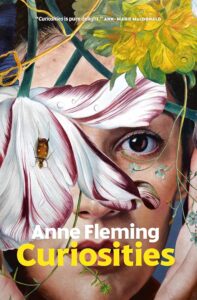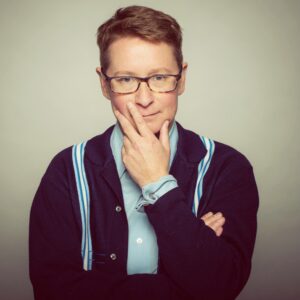‘Gloriously, stubbornly, interestingly themselves’
Curiosities
by Anne Fleming
Toronto: Knopf Canada, 2024
$35.00 / 9781039004979
Reviewed by Jessica Poon
*

Curiosities by Victoria’s Anne Fleming (Anomaly) is an imaginatively rendered historical novel that makes ample use of a multiplicity of voices. A historian, whose name is also Anne, intersperses the disparate voices. If I had to use only one adjective to describe this novel, it would be layered.
Anne is an amateur historian who unearths five manuscripts that describe the same people and events, but from different points of view. In the 1600s, Joan and Thomasina (who prefers being called Tom) are the only survivors of plague in their rural pocket of England, surviving off the milk of a goat—directly from the teat—and the kindness of an idiosyncratic woman they call Old Nut, who will later be condemned as a witch. Both Joan and Tom see that Old Nut has a horn and that she regularly feeds mice. From Joan’s perspective, “Old Nut might be a witch, she might indeed, but if she were, Joan was afraid of no witch.” Joan’s open-mindedness, however, is not the general consensus.
Joan and Tom grow close, but end up on their separate journeys. Joan becomes the maid and confidante of Lady Margaret, who takes a liking to her. Joan’s time with Lady Margaret is initially written in what seems to be chaste, read-between-the-lines homoerotic subtext, but later becomes more explicit when Lady Margaret pronounces, “I am strangely drawn to you, Joan, as if our bodies were very magnets.” Meanwhile, Tom goes to Virginia, where he, more than ever before, presents himself masculinely and goes by Tom more vociferously.
Later in life, Joan and Tom meet again but since this is not a star-crossed tale of young adults, complications ensue. John Heard, an anxious clergyman, witnesses Joan and Tom together intimately. He realizes that Tom does not have a penis and comes to the inaccurate, but befitting-to-the-1600s, conclusion that Joan has somehow “unmanned” Tom like some ancient predecessor of Lorena Bobbitt. Echoing the fate of Old Nut, Joan is accused of witchcraft.
Anne the historian writes: “Minor figures are, to me, the most interesting, because aren’t most of us minor characters? And aren’t we interesting? We are. I assert this over and over. We are. Ordinary, weird. Which is to say: human. The minor figures I’ve come to know in this research are gloriously, stubbornly, interestingly themselves.” By zeroing in on figures who very easily could have disappeared forever, past lives so unknown they may as well not have existed, Anne’s “minor figures” feel intensely detailed; major, even.

My personal favourite lines from the entire novel comes from Anne: “People are weird. People have diarrhea.” And yet, people, whether in the 1600s or right now, are awfully keen to otherize, to conveniently forget that weirdness and diarrhea don’t discriminate—that we are all, truly, more alike than we tend to admit. And, perhaps, it’s this uncomfortable—though, I argue, it ought to be comforting—recognition of our similarities that leads to horrifically divisive clannishness and, historically frequently, tragic consequences.
When it comes to the voices of Lady Margaret Long, Joan, John Heard, and Tom, archaic spellings are de rigueur. At first, it took me a while to become accustomed to having wife rendered as “Wyf” or “certain” spelled as “certayne.” This complexly interwoven tale is not the kind of breezy novel you can feasibly read as a half-drunk insomniac in your underwear—this novel requires your precise attention and nerdiness, for which you will be rewarded.
Anne the historian uses contemporary spellings, but she, too, is prone to words like “herewith.” That being said, I enjoyed Anne the historian’s voice the most—partly because I was relieved to experience comparatively contemporary spellings; partly because of her infectious, evident enthusiasm for her subject matter; and partly because I’m of the camp that believes that metacommentary is captivating. Anne the historian’s voice is like having Sparknotes, crossed with memoirist scholarliness, embedded within the text itself, able to gently guide the reader.
The penultimate section, preceding Anne’s final note, is titled “Letters from Hudson Bay, Never Received”—pages of one-way correspondence from Tom to Joan. In the way unreceived missives tend to be, it’s both sad and understated and made me want to time travel to the simpler times of relying on goat milk straight from the teat.
By collating five manuscripts concerning the same parties but from vastly different prerogatives, Curiosities does what the present tense cannot—provide a comprehensive picture. The reader, and Anne, can benefit from a carefully considered portrait of retrospective wisdom. But what of the long deceased “minor figures” in all their simultaneously wondrous and awful humanity? This, here, is a tragedy—to have wisdom that cannot change the past. As for the present, well.
*

Originally from East Vancouver, Jessica Poon is a writer, former line cook, and pianist of dubious merit who recently returned to BC after completing a MFA in Creative Writing at the University of Guelph. [Editor’s note: Jessica Poon has reviewed books by Miriam Lacroix, Taslim Burkowicz, Sam Wiebe, Amy Mattes, Louis Druehl, Sheung-King, Loghan Paylor, Lisa Moore (ed.), Sandra Kelly, Robyn Harding, Ian and Will Ferguson, Christine Lai, Logan Macnair, Jen Sookfong Lee, J.M. Miro (Steven Price), Bri Beaudoin, Tetsuro Shigematsu, Katie Welch, Megan Gail Coles, and Ayesha Chaudhry for BCR]
*
The British Columbia Review
Interim Editors, 2023-25: Trevor Marc Hughes (non-fiction), Brett Josef Grubisic (fiction and poetry)
Publisher: Richard Mackie
Formerly The Ormsby Review, The British Columbia Review is an online book review and journal service for BC writers and readers. The Advisory Board now consists of Jean Barman, Wade Davis, Robin Fisher, Barry Gough, Hugh Johnston, Kathy Mezei, Patricia Roy, Maria Tippett, and Graeme Wynn. Provincial Government Patron (since September 2018): Creative BC. Honorary Patron: Yosef Wosk. Scholarly Patron: SFU Graduate Liberal Studies. The British Columbia Review was founded in 2016 by Richard Mackie and Alan Twigg.
“Only connect.” – E.M. Forster
6 comments on “‘Gloriously, stubbornly, interestingly themselves’”